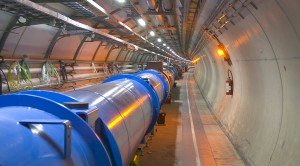The CERN Large Hadron Collider (LHC) costs a lot of money to the tax-payers and there is no guarantee for any discovery. However, the benefits to the society are huge and one should not restrain ourselves from supporting large-scale research infrastructure regardless of the scientific results.
Fundamental research can bring a lot to the society (regardless of any potential discovery). I will demonstrate this statement with an example that I know about: the LHC.
This post is organized as:
- A cost-benefit analysis for the LHC?
- The costs
- Benefits to scientists
- Benefits to human capital formation and the private sector
- Benefits to the general public
- Let us stop the blabla and do the maths

A COST-BENEFIT ANALYSIS FOR THE LHC?
Let me first summarize what is the LHC and then try to show how its value can be estimated.
The LHC is a machine that has been built from 1993 to 2008 by CERN, and that is part of a full accelerator complex. This complex is maintained and operated by CERN and used by several experiments operated by dedicated collaborations of researchers from all around the world. Furthermore, the performed experimental analyses use computer power from all around the planet.
A reasonable cost-benefit analysis should therefore account for the size of the facility, the number of people involved and the past and future lifespan of the machine (from its construction in 1993 to its planned decommissioning in 2025).
What we want to calculate is the net present value of the LHC, which is given by the difference between the benefits ( B ) and the costs ( C ). If this number is positive, the LHC brings an added value to the society.
The net present value of the LHC can be evaluated as

where the sums accounts for different moments where benefits and costs are computed.
This formula also includes the social discount rate r allowing for converting a future benefit in terms of a reference taken to be today.

THE COSTS
The LHC costs are originating from three sources. One has of course the construction costs, but also the costs related to the upgrade of the machine with time and the operation costs.
Each of these three items embed both costs from the personnel side (salaries for instance) and material side.
BENEFITS TO SCIENTISTS
The benefit of the LHC to scientists is the generation of experimental data that allow to publish new research. This can be evaluated as the value of the associated publications.
Very importantly, fundamental research should stay decoupled from the applications of the potential discoveries that are very hard to estimate and thus ignored in any reasonable benefit-cost analysis.
It is however very hard to assess the value of a scientific publication. No one knows whether and when a theoretical predictions will be discovered maybe decades later, and whether it will lead to any practical applications. There is only a non-zero chance to any new knowledge could have an economic impact.
Take for instance general relativity (1917) and the GPS application today. How to assess the value of the general relativity paper in 1920?
The discovery itself as a new knowledge has nevertheless some (non-use or passive-use) value. Only this should be accounted in a cost-benefit analysis.
On different lines, it is also not that easy to estimate the impact (and thus the value) of a publication on the scientific community (track records, etc.). One possible way is to estimate that the value of a publication is equal to the salary costs that are necessary for producing it. This is what the European Union does.
Extra benefits, such as occurring from articles by non-LHC scientists citing LHC publications must also be accounted. However, all available models for calculating them show that they are negligible.

BENEFITS TO HUMAN CAPITAL FORMATION AND THE PRIVATE SECTOR
From 1993 to 2025, it is estimated that more that 35000 early-stage career researchers will take part to the LHC program that will thus have an effect on their curriculum. The related gain in experience as well as on their future earnings can be seen as parts of the LHC impact on society.
Moreover, private companies directly involved in the LHC nebula are also beneficiaries of the LHC as they will participate to the co-design with LHC researchers of new technologies (learning by doing).
Although the costs to CERN arising from procurement cannot be considered as a benefit, the methods and technologies that have been developed can be further sold by the involved companies (I recall that CERN almost never patents its own inventions).
Similarly, companies external to the LHC could also benefit from some transfers of knowledge from CERN for free.
In addition, two world-widely used software (ROOT and GEANT4) have been developed for analyzing LHC data and have been made available for free to the society.
They are now used a lot outside physics, for free, without any licensing cost to pay.
BENEFITS TO THE GENERAL PUBLIC
There is also an ensemble of direct cultural benefits of the LHC. Those beneficiaries include in particular everyone visiting CERN and its exhibitions.
Moreover, the LHC coverage in media can also be converted as a benefit (in terms of audience).
Finally, websites and social media play a role, as well as outreach activities such as project exploiting some computing time donated by users.

LET US STOP THE BLABLA AND DO THE MATHS
All of the points above can be converted in euros. This has been done in this article that is written by three of my colleagues and that has been submitted to the Technological Forecasting and Social Change journal.
One can find many details on their methodology and calculations based on European Union and CERN data as well as on interviews with many people involved in the LHC.
Please find below their summary (1 GEUR = 1 Giga-euro = 1 billion euros):
- Costs: 13.5GEUR excluding the personal costs
- Benefits to scientists: 0 EUR (compensating exactly the personal costs)
- Scientific knowledge as a public good: 3.2 GEUR
- Benefits to human capital formation: 5.5 GEUR
- Benefits to the industry: 5.6 GEUR
- Benefits to the general public: 2.1 GEUR

 [
[ [
[